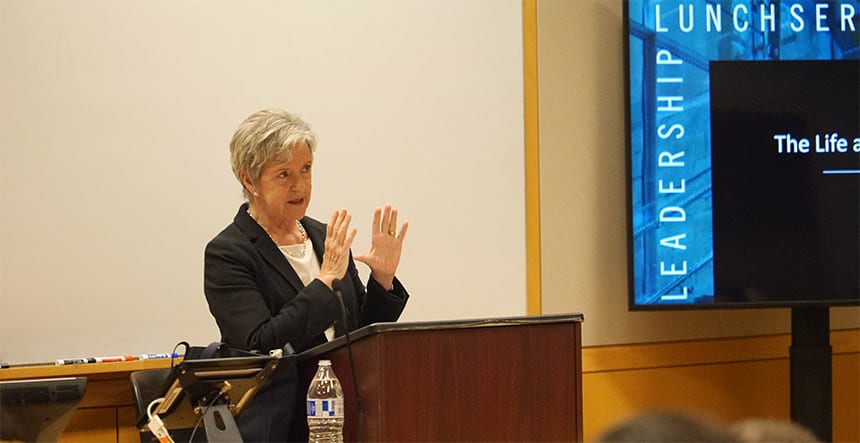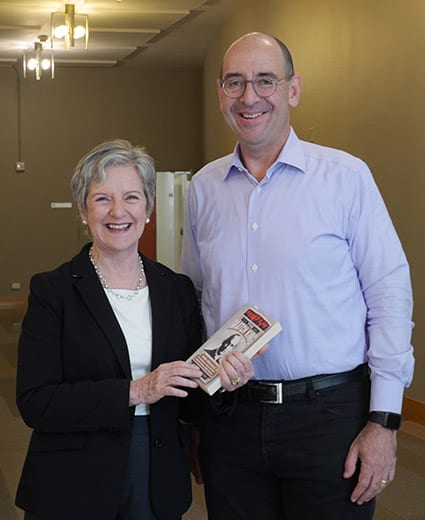
Berkeley Law’s booming business law program got another momentum jolt with the launch of a Writer in Residence program–and an exceptional first participant.
The new Berkeley Center for Law and Business (BCLB) initiative welcomed Diana Henriques, an award-winning financial journalist and author who has been a staff reporter and contributing writer at The New York Times since 1989. She has written several critically acclaimed books, including the best-selling The Wizard of Lies, the definitive book on Bernie Madoff, and A First Class Catastrophe, about the 1987 stock market crash.
Henriques has specialized in investigative reporting on white-collar crime, market regulation, and corporate governance. She is widely respected for her reporting on complex financial stories, from Enron and Long-Term Capital Management to tax breaks and regulatory exemptions for religious nonprofits.
Her work exposing the exploitation of American military personnel by financial services companies led to legislative reform and cash reimbursements for tens of thousands of defrauded service members. She received a George Polk Award, Harvard’s Goldsmith Prize for Investigative Reporting, the Worth Bingham Prize, and was a Pulitzer finalist for that reporting, which also drew recognition and thanks from military lawyers and families across the country.
The timing of Henriques’ week-long visit to Berkeley was perfect: she is working on a new book about the history of financial regulation and the New Deal. In addition to giving a talk to students, she met one-on-one with students and faculty, sat for a video interview for a new online executive education course on finance for lawyers, and helped build a bridge between Berkeley’s law school and investigative journalism program.
Henriques has agreed to chair Berkeley’s efforts to study financial fraud and is helping plan BCLB’s third annual financial fraud conference, to be held May 20, 2020 in New York. She recently reflected on her visit with Professor and BCLB Faculty Co-Director Frank Partnoy.

FP: I hope you’ve had a chance to recover from your whirlwind week at Berkeley. What were some of the highlights?
DH: I was so impressed by your students. They were such a receptive group and asked so many interesting questions. It was a wonderful affirmation to have a female student tell me how much she appreciated hearing from a woman with my background. One student was interested in shifting into journalism, and I’ve already connected him with two friends of mine who came out of a legal background and now work in journalism. One student was doing a paper on some of the Madoff litigation, and asked me about that. There was a real personal interaction. Being on campus personally enabled meaningful conversations for me that wouldn’t have been possible otherwise.
FP: Is that the benefit of being “in residence?”
DH: Exactly. I also was able to interact one-on-one with many of your faculty stars about topics where our interests overlapped. I had eight or nine one-on-one meetings with faculty, and every single encounter was valuable. I had a wonderful meeting with Eric Rakowski about mutual fund governance. We talked about my book, Fidelity’s World, and the strengths of the legislation that created the mutual fund industry. He knows the industry well and has sat on mutual fund boards for a long time, and we discussed some topics such as the emergence of exchange traded funds, which are relevant to the tail end of the book I’m working on now.
FP: I enjoyed watching you mix it up with our professors over dinner as well. You did two dinners with faculty.
DH: The dinner with you was terrifically helpful. I especially enjoyed talking to Abbye Atkinson about her research on credit and debt, and it was so useful to see how scholars like Abbye are exploring debt in abstract ways from dramatically different perspectives. I’ve been a journalist for 50 years; most of what I talked to her about was completely new to me and I think it should inform how journalists talk about different aspects of debt.
The other faculty dinner was also fantastic. Bill Douglas is a difficult and controversial figure, and he plays an important role in my new book. Well, Professor Richard Buxbaum was at dinner and he shined an incredible spotlight on how Douglas’s early years at the Securities and Exchange Commission influenced his later views as a Supreme Court Justice, especially in shaping the bankruptcy courts as courts of equity. That’s Chapter 1 of my new book. And then Richard followed up after dinner with a long, glorious email about Douglas. What a priceless encounter! I also got to hear stories about how Richard drove around the country with Nabokov and other literary giants.
FP: I’ve heard some of those stories. His office is right across from mine, and it’d be intimidating to have such an intellectual giant around all the time if he weren’t so disarming and nice! You spent some time with our dean as well.
DH: I’m a huge fan of Erwin Chemerinsky. He’s been in my source rolodex for so long, back when it actually was a rolodex. We first encountered each other for a New York Times investigative series I was doing on religious nonprofits and their role in the economy, and the way they are advantaged. This time, we talked about some of our common ground, and it was very interesting to hear about his vision for the law school. I know him as a subject matter expert in constitutional law, so to see him as an inspirational leader in this new context was exhilarating. Meeting with the dean made me feel like a star because he’s such a star. He remains a hero of mine, and always will be.
FP: I appreciated you also being an ambassador with David Barstow, who joined Berkeley this academic year to run our investigative journalism program. He and I have been talking about some joint projects between the law school and the journalism school. You’ve worked with David and have known him for many years. How did that go?
DH: By being a writer in residence at the law school, I was able to interact with the journalism program in what I think is a new way, to see some new connections, to bring them information about the expertise that is right across campus, and to talk to them about resources that are available in the law school and vice versa. The fact that Berkeley has both a powerhouse law school and a powerhouse investigative journalism program really makes it all supercharged.
FP: Writing business or financial history books is a tough market. But everyone I talked to who spent time with you is excited about this new one.
DH: It was great to be able to talk about my new book project in its formational stages with such smart people. So many people had good ideas about the book. Sure they were interested in Bernie Madoff and the HBO movie, but also more generally securities regulation and financial history. It was perfect to help me get this new baby book onto its feet. I had a space and time apart from my usual routine, so I could be open to advice and reactions and expertise. It was validating at a time when I really needed it. I’d recommend this program to anybody. The format was great.
FP: You have to promise to come back and talk to us about your new book when you’ve finished.
DH: It will be my first stop.